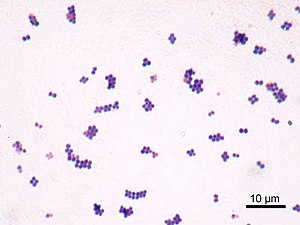 Image via Wikipedia
Image via Wikipedia
However, this strain of flu isn't the only nasty bug out there. History is full of viruses and bacteria that have laid waste to populations too worried about one particular vexing problem to keep both eyes on another. One such superbug that should be on the radar of health care professionals is methicillin-resistant Staphylococcus aureus (MRSA). This particularly troublesome bacteria strain has been around for a few years and no longer has any trouble fighting off antibiotics. Worse, MRSA has been found to be able to move back and forth between people and their pets. That's right: If your cat bites through the skin and deep into a couple layers of your skin, you might get it checked out. Most cases of MRSA cause mild skin infections, resulting in pimples or boils. At best, that's uncomfortable. And, because it's a superbug, it can't be treated with normal antibiotics.
(It should also be said here that MRSA is now resistant not only to methicillin but also other common antibiotics such as amoxicillin, penicillin, and oxacillin.) And, the more of these kinds of drugs doctors throw at MRSA, the more it adapts and "perfects" itself. The superbug has become so common that it now makes up 60 percent of staph infections in U.S. hospitals.
A recent study has confirmed the suspicion that animal bites can be the cause of a person's catching the superbug from his or her pet dog or cat. Children have been found to be particularly susceptible to this superbug transmission.
It's not just normal domestics, either. Horse bites have been found to have transmitted MRSA from quadriped to owner.
It's also not just at home or on the farm that this superbug can get hold of you. MRSA has been found on beaches. This last fact should be especially filed away in the conscience of the thousands of people who are looking forward to a nice holiday at ocean's edge in the coming days and weeks.
Doctors have struggled to adequately treat patients with MRSA, mainly because the superbug itself is resistant to one of the most common anti-infection drugs, methicillin. (Go back and read the full name of the superbug.) The best way to treat it, apparently, is not to get it in the first place.
Awareness is always the best medicine in cases such as these.
![Reblog this post [with Zemanta]](http://img.zemanta.com/reblog_e.png?x-id=ad65c09b-98d5-4deb-8fa9-04fa374548a0)
No comments:
Post a Comment